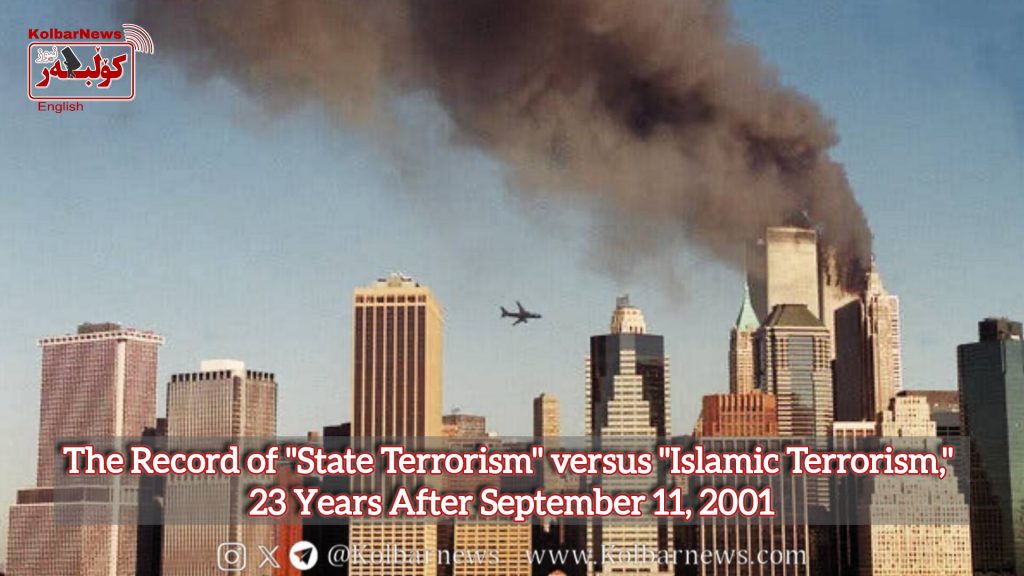
On September 11, 2001, the deadliest and largest “terrorist” operation in U.S. history took place. The political, military, and economic consequences of this event became a turning point in contemporary world history. On the morning of September 11, 2001, two passenger planes, 15 minutes apart, crashed into the Twin Towers of the World Trade Center in New York City. As a result, all the passengers, along with many inside the buildings, were killed. Both towers were completely destroyed within two hours, causing significant damage to surrounding buildings. Thirty minutes after the second plane hit, a third plane crashed into the Pentagon, the U.S. Department of Defense headquarters. A fourth plane, part of the same terrorist plot, crashed in Pennsylvania without hitting any buildings, apparently directed toward Washington, D.C. None of the passengers on the four flights survived. In total, around 3,000 people were killed in these events. The hijackers were 15 Saudi nationals, two from the United Arab Emirates, one from Egypt, and one from Lebanon, all members of the extremist Islamist group al-Qaeda.
Even 23 years after the events of September 11, aspects of this unprecedented terrorist plan remain unclear. Hundreds of books and articles have been written about the event and its impact on the world. However, there is still talk of a 28-page report regarding the Saudi government’s role in the 9/11 attacks, which the U.S. government has allegedly kept hidden from the public due to its economic and political interests.
Following 9/11, the U.S. first attacked Taliban-controlled Afghanistan, where one of al-Qaeda’s bases was located. In 2003, despite no evidence linking Iraq to the 9/11 attacks, the U.S. invaded Iraq. This occupation did not bring security to the region but instead paved the way for the emergence of extremist Islamist groups, including ISIS in Iraq and Syria. It sparked a sectarian war between Shia and Sunni factions, claiming hundreds of thousands of lives. For the U.S. military, the war resulted in over 4,000 deaths, 50,000 wounded, and $3 trillion in costs.
While 9/11 was a human tragedy, it also marked the beginning of a new era in international relations and global politics. It ended a decade of uncertainty in global power dynamics following the Cold War and the collapse of the Soviet Union. The event provided the U.S. government with the pretext and opportunity to pursue its objectives through military dominance, after failing to maintain global leadership in the post-Cold War world due to its economic decline. Thus, the 9/11 attacks became a justification for a series of direct U.S. military interventions around the world. However, these interventions did not lead to political stability in crisis regions. Many global economic experts even believe that these interventions contributed to the global economic crisis of 2007-2008. Claims such as “humanitarian interventions,” “democracy in the Greater Middle East,” and the “war on terror” used by U.S. propaganda to justify these invasions quickly fell apart.
U.S. military interventions, especially in Iraq and Afghanistan, not only failed to bring security, stability, or democracy but also exacerbated local and regional conflicts, providing fertile ground for the growth of terrorist movements. Hundreds of times more innocent lives were lost during the U.S. and its allies’ state terrorism campaign in the name of fighting terrorism—especially through indiscriminate bombings—than those who died from Islamic terrorism on September 11, 2001.
Twenty-three years after the U.S. invasion of Afghanistan, the U.S. withdrew in a humiliating retreat, returning political power to the Taliban once again. The U.S. government’s efforts to create a “New World Order” based on military power failed. Local powers abandoned the policy of unconditional subservience to U.S. strategies.
The multipolar political order within global capitalism, which followed the events of September 11, 2001, and its aftermath, has now been firmly established.
However, the world remains deeply insecure for its inhabitants, both due to “state terrorism” and “group terrorism.” This insecurity is rooted in the survival of an unjust system whose historical time has passed but still claims human lives as it fades into decline.

